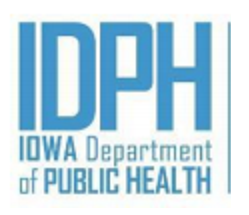
The following is from the Iowa Department of Public Health
Q: What is 2019 Novel Coronavirus?
A: 2019 Novel Coronavirus, or COVID-19, is a new respiratory virus first identified in Wuhan, Hubei Province, China.
The virus has now been detected in multiple locations internationally, including in the United States.
Q: How does the virus spread?
A: Many of the initial patients in the outbreak had a link to a large seafood and live animal market in Wuhan, China,
suggesting animal-to-person spread. However, the virus is now being spread person-to-person. Most often, spread
from person-to-person happens among close contacts (about 6 feet), mainly via respiratory droplets produced when
an infected person coughs or sneezes, similar to how influenza and other respiratory pathogens spread. These
droplets can land in the mouths or noses of people who are nearby or possibly be inhaled into the lungs. It may be
possible that a person can get COVID-19 by touching a surface or object that has the virus on it and then touching
their own mouth, nose, or possibly eyes, but this is not thought to be the main way the virus spreads.
Q: Is COVID-19 the same as other coronaviruses?
A: It is important to understand that there are seven different coronaviruses known to infect humans. Four of the
seven coronaviruses are very common, cause milder symptoms (similar to the common cold), and most people will
be infected with at least one of these in their lifetime. The other three of the seven coronaviruses are rare and can
cause more severe illness; these include the COVID-19.
Q: Is there a risk for COVID-19 from products or packages shipped from China?
A: People receiving imported goods from China are not at risk of contracting COVID-19. Coronaviruses do not survive
long on objects such as letters or packages.
Q: We have employees scheduled to travel internationally. Should they go?
A: Check the CDC’s Traveler’s Health Notices for the latest guidance and recommendations for each country to
which you will travel. Specific travel information for travelers going to and returning from China, and information for
aircrew, can be found at on the CDC website. Advise employees to check themselves for symptoms of acute
respiratory illness before starting travel and notify their supervisor and stay home if they are sick.
Q: What if an employee recently returned from international travel?
A: Individuals returning to the U.S. from areas where a Level 3 Travel Health Notice has been issued should
voluntarily self-isolate for 14 days after returning. Self-isolation means staying home the majority of the time, not
going to public areas, using public transportation, or attending large gatherings. Individuals should watch for fever
and cough or difficulty breathing. If they develop either of these in the 14 days after returning, they should call ahead
to their doctor and tell them about their recent travel and symptoms. As always, it is recommended individuals ill with
any infectious disease stay home while ill to prevent spread to others.
Q: What is the risk of the COVID-19 to Iowans? Are certain groups of people more likely to be infected with COVID-19 than others?
A: There is currently community spread of COVID-19 in Iowa. This means the virus is circulating in the state. All
Iowans should watch for signs and symptoms of COVID-19. At this time, it appears older Iowans and those with
underlying chronic health conditions are at higher risk of serious illness and/or complications of COVID-19.
Q: What can employers do to reduce the risk of spread of respiratory illness within the workplace?
A: CDC recommends the following as best practices for reducing the spread of illness in the workplace:
- Actively encourage sick employees to stay home:
- Employees who have symptoms of acute respiratory illness are recommended to stay home and not
come to work until they are free of fever and any other symptoms for at least 24 hours, without the
use of fever-reducing or other symptom-altering medicines (e.g., cough suppressants). - Ensure that your sick leave policies are flexible and consistent with public health guidance, and that
employees are aware of these policies. - Talk with companies that provide your business with contract or temporary employees about the
importance of sick employees staying home and encourage them to develop non-punitive leave
policies. - Do not require a healthcare provider’s note for employees who are sick with acute respiratory illness
to validate their illness or to return to work. - Employers should maintain flexible policies that permit employees to stay home to care for a sick
family member.
- Employees who have symptoms of acute respiratory illness are recommended to stay home and not
- Separate sick employees:
- CDC recommends that employees who appear to have acute respiratory illness symptoms (i.e.,
cough, shortness of breath) upon arrival to work or become sick during the day should be separated
from other employees and be sent home immediately. Sick employees should cover their noses and
mouths with a tissue when coughing or sneezing (or an elbow or shoulder if no tissue is available).
- CDC recommends that employees who appear to have acute respiratory illness symptoms (i.e.,
- Emphasize staying home when sick, respiratory etiquette and hand hygiene by allemployees:
- Place posters that encourage staying home when sick, cough and sneeze etiquette, and hand
hygiene at the entrance to your workplace and in other workplace areas where they are likely to be
seen. - Provide tissues and no-touch disposal receptacles for use by employees.
- Instruct employees to clean their hands often with an alcohol-based hand sanitizer that contains at
least 60-95% alcohol, or wash their hands with soap and water for at least 20 seconds. Soap and
water should be used preferentially if hands are visibly dirty.
- Place posters that encourage staying home when sick, cough and sneeze etiquette, and hand
- Provide soap and water and alcohol-based hand rubs in the workplace. Ensure that adequate
supplies are maintained. Place hand rubs in multiple locations or in conference rooms to encourage
hand hygiene.
Perform routine environmental cleaning:- Routinely clean all frequently touched surfaces in the workplace, such as workstations, countertops
and doorknobs. Use the cleaning agents that are usually used in these areas and follow the
directions on the label. - Provide disposable wipes so that commonly used surfaces (for example, doorknobs, keyboards,
remote controls, desks) can be wiped down by employees before each use.
- Routinely clean all frequently touched surfaces in the workplace, such as workstations, countertops
Q: Who should I call if I have questions?
A: Please contact 211
Featured image courtesy of the Iowa Department of Public Health
